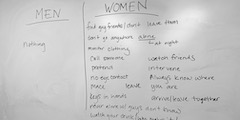The Myth of the 50-Minute Epiphany: #MeToo and Implications for Teaching
DOI:
https://doi.org/10.20343/teachlearninqu.11.24Keywords:
gender, lesson study project, sexual assault, political polarizationAbstract
Because university campuses are microcosms of broader political and social climates, the increasingly polarized climates outside universities can permeate the classroom, challenging faculty who teach topics characterized by controversy and discomfort. We conducted a lesson study project at a college in the southeastern United States in three first-year courses from different disciplines to examine how the broader tensions of the #MeToo movement emerged and affected a class activity focused on gender. We sought to understand our students’ responses to a moment of discomfort generated by discussions of sexual roles, consent, and assault—issues that are relevant in both this cultural moment and in the lives of many first-year college students. We observed responses ranging from affirmation to resistance in what felt at times like our own failure. Without this collaboration, each of us may have been left with a narrower view of what the students learned and an incomplete sense of our own work. What began as an investigation into students’ transformative learning experiences ended as a transformative experience in our own understanding of the acts of teaching and the complexities of student learning.
Click here to read the corresponding ISSOTL blog post.
References
Bennet, Jessica, and Daniel Jones. 2018. “45 Stories of Sex and Consent.” The New York Times, 10 May 2018. https://www.nytimes.com/interactive/2018/05/10/style/sexual-consent-college-campus.html.
Blair, Erik. 2013. “The Challenge of Contextualising the Scholarship of Teaching and Learning.” Teaching & Learning Inquiry 1 (1): 127–30. https://doi.org/10.20343/teachlearninqu.1.1.127.
Brookfield, Stephen D. 1995. Becoming a Critically Reflective Teacher. San Francisco: Jossey-Bass.
Campbell, Margaret, Charlotta Löfgren-Mårtenson, and Alan Santinele Martino. 2020. “Cripping Sex Education.” Sex Education 20 (4): 361–65.
Cerbin, Bill. 2011. Lesson Study: Using Classroom Inquiry to Improve Teaching and Learning in Higher Education. Sterling, VA: Stylus.
Chng, Huang Hoon, and Peter Looker. 2013. “On the Margins of SoTL Discourse: An Asian Perspective.” Teaching & Learning Inquiry 1 (1): 131–45. https://doi.org/10.20343/teachlearninqu.1.1.131.
Department of Justice, Office of Justice Programs, Bureau of Justice Statistics. 2000. Sexual Assault of Young Children as Reported to Law Enforcement. https://bjs.ojp.gov/library/publications/sexual-assault-young-children-reported-law-enforcement-victim-incident-and.
DeTemple, Jill, and John Sarrouf. 2017. “Disruption, Dialogue, and Swerve.” Teaching Theology & Religion 20 (3): 283–92. https://doi.org/10.1111/teth.12398.
De Zutter, Andre W. E. A., Robert Horselenberg, and Peter J. van Koppen. 2017. “The Prevalence of False Allegations of Rape in the United States from 2006-2010.” Journal of Forensic Psychology 2 (2). https://doi.org/10.4172/2475-319X.1000119.
Edwards, Sarah R., Kathryn A. Bradshaw, and Verlin B. Hinsz. 2014. “Denying Rape but
Endorsing Forceful Intercourse: Exploring Differences Among Responders.” Violence and Gender 1 (4): 188–93. https://doi.org/10.1089/vio.2014.0022.
Fallon, Dianne. 2016. “‘Lucky to Live in Maine’: Examining Student Responses to Diversity Issues.” Teaching English in the Two-Year College 33 (4): 410–20.
Fan, Yanan, L. J. Shepherd, Eve Slavich, D. Waters, M. Stone, Rachel Abel, and Emma L. Johnston. 2019. “Gender and Cultural Bias in Student Evaluations: Why Representation Matters.” Plos ONE 14 (2). https://doi.org/10.1371/journal.pone.0209749.
Federal Student Aid. n.d. “Federal Pell Grants are Usually Awarded Only to Undergraduate Students.” Accessed 7 March 2022. https://studentaid.gov/understand-aid/types/grants/pell.
Felten, Peter. 2013. “Principles of Good Practice in SoTL.” Teaching & Learning Inquiry 1 (1): 121–25. https://doi.org/10.20343/teachlearninqu.1.1.121.
Fitzgerald, Kathleen J., and Kandice L. Grossman. 2018. Sociology of Sexualities. Thousand Oaks, CA: Sage Publications.
Gannon, Kevin. 2020. Radical Hope: A Teaching Manifesto. Morgantown, WV: West Virginia University Press.
Katz, Jackson. 2006. The Macho Paradox: Why Some Men Hurt Women and How All Men Can Help. Naperville, IL: Sourcebooks.
Land, Ray, Jan F. K. Meyer, and Caroline Baillie. 2010. “Editor’s Preface: Threshold Concepts and Transformational Learning.” In Threshold Concepts and Transformational Learning, edited by Ray Land, Jan F. K. Meyer, and Caroline Baillie, ix–xlii. Boston: Sense.
Lang, James. 2016. Small Teaching: Everyday Lessons from the Science of Learning. San Francisco: Jossey-Bass.
Lewis, Catherine, Rebecca Perry, and Aki Murata. 2006. “How Should Research Contribute to Instructional Improvement? The Case of Lesson Study.” Educational Researcher 35 (3): 3–14.
Lukianoff, Greg, and Jonathan Haidt. 2018. The Coddling of the American Mind: How Good Intentions and Bad Ideas Are Setting Up a Generation for Failure. New York: Penguin.
McGarry, Robert. 2013. “Build a Curriculum that Includes Everyone.” Phi Delta Kappan 94 (5): 27–31.
Pan, Steven C. 2015. “The Interleaving Effect: Mixing It Up Boosts Learning.” Scientific American, 4 Aug 2015. https://www.scientificamerican.com/article/the-interleaving-effect-mixing-it-up-boosts-learning/.
Perkins, D. N., Richard Allen, and James Hafner. 1983. “Difficulties in Everyday Reasoning.” In Thinking: The Expanding Frontier, edited by William Maxwell, 177–89. Philadelphia, PA: The Franklin Institute Press.
Saldaña, Johnny. 2013. The Coding Manual for Qualitative Researchers. Los Angeles: Sage.
Schwalbe, Michael, Sandra Godwin, Daphne Holden, Douglas Schrock, Shealy Thompson, and Michele Wolkomir. 2000. “Generic Processes in the Reproduction of Inequality: An Interactionist Analysis.” Social Forces 79 (2): 419–52. https://doi.org/10.2307/2675505.
Shulman, Lee S. 2014. “Value of Contextualized Work and Aggregated SoTL Data.” Center for Engaged Learning Youtube Channel. https://www.youtube.com/watch?v=cJYJuelKfv8.
Strayhorn, Terrell L. 2019. College Students’ Sense of Belonging: A Key to Educational Success for All Students. Routledge.
Tolley, Elizabeth E., Priscilla R. Ulin, Natasha Mack, Elizabeth T. Robinson, Stacey M. Succop. 2016. Qualitative Methods in Public Health: A Field Guide for Applied Research. San Francisco: John Wiley & Sons.
“Transcript: Donald Trump’s Taped Comments About Women.” 2016. New York Times, October 8, 2016. https://www.nytimes.com/2016/10/08/us/donald-trump-tape-transcript.html.
Wade, Lisa. 2017. American Hookup: The New Culture of Sex on Campus. New York: W.W. Norton & Company.
Wahman, M. Lauren, Amber Burkett Peplow, Rita Kumar, Brenda Refaei. 2020. “Benefits of Using Lesson Study for SoTL, Cross-Disciplinary Research, and Assessment.” International Journal for the Scholarship of Teaching and Learning 14 (1): 2. https://doi.org/10.20429/ijsotl.2020.140102.
Wooten, Sara Carrigan. 2017. “Revealing a Hidden Curriculum of Black Women’s Erasure in Sexual Violence Prevention Policy.” Gender and Education 29 (3): 405–17.

Downloads
Published
Issue
Section
License
Copyright (c) 2023 Emily Russell, Nolan Kline, Amy I. McClure, Steven W. Schoen, Nancy L. Chick

This work is licensed under a Creative Commons Attribution-NonCommercial 4.0 International License.






